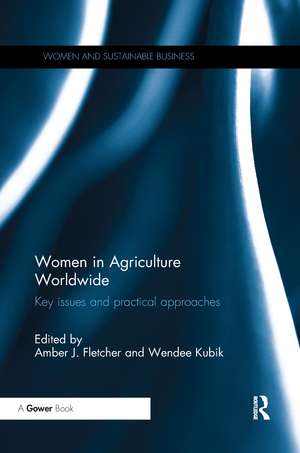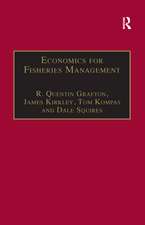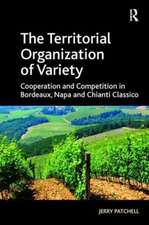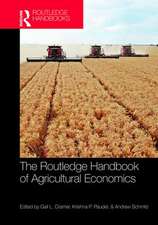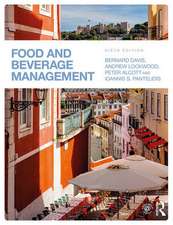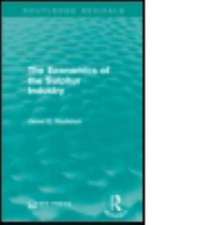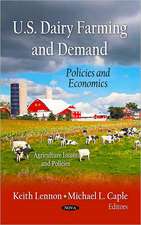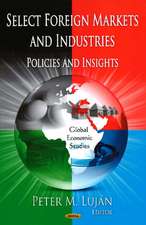Women in Agriculture Worldwide: Key issues and practical approaches: Women and Sustainable Business
Editat de Amber Fletcher, Wendee Kubiken Limba Engleză Paperback – 30 iun 2020
Fletcher and Kubik cross this political, economic, and ideological division by drawing together authors from 5 continents. They discuss the situation for women in agriculture in 13 countries worldwide, with two chapters that cover international contexts. The authors blur the boundaries between academic and organizational authors and their contributors include university-based researchers, gender experts, development consultants, and staff of agricultural research centers and international organizations (i.e., Oxfam, the United Nations World Food Program). The common thread connecting these diverse authors is an emphasis on practical and concrete solutions to address the challenges, such as lack of access to resources and infrastructure, lack of household decision-making power, and gender biases in policymaking and leadership, still faced by women in agriculture around the world. Ongoing issues in climate change will exacerbate many of these issues and several chapters also address environment and sustainability.
This book is of great interest to readers in the areas of gender studies, agriculture, policy studies, environmental studies, development and international studies.
| Toate formatele și edițiile | Preț | Express |
|---|---|---|
| Paperback (1) | 236.58 lei 43-57 zile | |
| Taylor & Francis – 30 iun 2020 | 236.58 lei 43-57 zile | |
| Hardback (1) | 1003.43 lei 43-57 zile | |
| Taylor & Francis – 11 iul 2016 | 1003.43 lei 43-57 zile |
Preț: 236.58 lei
Preț vechi: 293.96 lei
-20% Nou
Puncte Express: 355
Preț estimativ în valută:
45.27€ • 47.39$ • 37.46£
45.27€ • 47.39$ • 37.46£
Carte tipărită la comandă
Livrare economică 07-21 aprilie
Preluare comenzi: 021 569.72.76
Specificații
ISBN-13: 9780367605315
ISBN-10: 0367605317
Pagini: 290
Dimensiuni: 156 x 234 mm
Greutate: 0.23 kg
Ediția:1
Editura: Taylor & Francis
Colecția Routledge
Seria Women and Sustainable Business
Locul publicării:Oxford, United Kingdom
ISBN-10: 0367605317
Pagini: 290
Dimensiuni: 156 x 234 mm
Greutate: 0.23 kg
Ediția:1
Editura: Taylor & Francis
Colecția Routledge
Seria Women and Sustainable Business
Locul publicării:Oxford, United Kingdom
Cuprins
INTRODUCTION - Context and Commonality: Women in Agriculture Worldwide - Amber J. Fletcher and Wendee Kubik
PART I. Women’s Agricultural Work: Addressing Inequality and Invisibility
AUSTRALIA - 1. Understanding the "Local" and "Global": Intersections Engendering Change for Women in Family Farming in Australia - Josephine Clarke and Margaret Alston
CANADA - 2. Who’s Counting…. on the Farm? - June Corman and Wendee Kubik
SOUTH AFRICA - 3. The Plight of Female Farm Workers on South African Farms - Maria-Stella Vettori
INTERNATIONAL - 4. The System of Rice Intensification and its Impacts on Women: Reducing Pain, Discomfort, and Labor in Rice Farming While Enhancing Households’ Food Security? - Olivia Vent, Sabarmatee, and Norman Uphoff
PART II. Gendering Sustainability and Food Security
BANGLADESH AND LAOS - 5. Women and Food Security in South Asia - Margaret Alston and Kerri Whittenbury
ZIMBABWE - 6. "Livelihoods in a Sack:" Gendered Dimensions of Sack Potato Farming Among Poor Households in Urban Zimbabwe - Manase Kudzai Chiweshe and Kudzai MacMillan Muzanago
BURKINA FASO - 7. Diversifying the Garden: A Way to Ensure Food Security and Women’s Empowerment - Liette Vasseur
INDIA - 8. Reviving and Strengthening Women’s Position and Agency in Ensuring Household Food Security: The Role of Home Gardens - Rengalakshmi Raj, E.D.I. Oliver King, B. Raghini, S. Abubaker Siddick, Venkatesan Gurumoorthy, and G. Kaleeswari
PART III. Women’s Empowerment in Policy and Finance
TANZANIA - 9. Improving Agricultural Land Tenure Security for Women: Assessing the FAO’s Voluntary Guidelines on Land Tenure - Andrea M. Collins
TANZANIA - 10. Addressing Challenges of Rural Women: A Focus on Tanzania - Godbertha Kinyondo
KENYA - 11. Can Sustainability be EnGENDERed through Informal Microfinance? A Case Study of the Kamba Merry-Go-Rounds in Ukambani, Eastern Province, Kenya - Carlyn James
BRAZIL - 12. Participation of Women Farmers in Food Procurement Policies in Brazil - Andrea Moraes and Cecilia Rocha
INTERNATIONAL - 13. The Rise of Institutional Food Procurement: A Tool for Empowering Women or Furthering the Status Quo? - Bryan Crawford-Garrett, Clare Mbizule, Karin Wachter, and Brian Sage
PART IV. Working for Social Change
MOROCCO - 14. From Empowerment to Transformative Leadership: Intersectional Analysis of Women Workers in the Strawberry Sector of Morocco - Julie Théroux-Séguin
UNITED STATES OF AMERICA - 15. Building Power through Community: Women Creating and Theorizing Change - Angie Carter, Betty Wells, Ashley Hand, and Jessica Soulis
CANADA - 16. Ploughing New Ground: A Feminist Interpretation of Youth Farm Internships in Ontario - Jan Kainer
CONCLUSION - 17. What Works for Women in Agriculture? - Amber J. Fletcher
PART I. Women’s Agricultural Work: Addressing Inequality and Invisibility
AUSTRALIA - 1. Understanding the "Local" and "Global": Intersections Engendering Change for Women in Family Farming in Australia - Josephine Clarke and Margaret Alston
CANADA - 2. Who’s Counting…. on the Farm? - June Corman and Wendee Kubik
SOUTH AFRICA - 3. The Plight of Female Farm Workers on South African Farms - Maria-Stella Vettori
INTERNATIONAL - 4. The System of Rice Intensification and its Impacts on Women: Reducing Pain, Discomfort, and Labor in Rice Farming While Enhancing Households’ Food Security? - Olivia Vent, Sabarmatee, and Norman Uphoff
PART II. Gendering Sustainability and Food Security
BANGLADESH AND LAOS - 5. Women and Food Security in South Asia - Margaret Alston and Kerri Whittenbury
ZIMBABWE - 6. "Livelihoods in a Sack:" Gendered Dimensions of Sack Potato Farming Among Poor Households in Urban Zimbabwe - Manase Kudzai Chiweshe and Kudzai MacMillan Muzanago
BURKINA FASO - 7. Diversifying the Garden: A Way to Ensure Food Security and Women’s Empowerment - Liette Vasseur
INDIA - 8. Reviving and Strengthening Women’s Position and Agency in Ensuring Household Food Security: The Role of Home Gardens - Rengalakshmi Raj, E.D.I. Oliver King, B. Raghini, S. Abubaker Siddick, Venkatesan Gurumoorthy, and G. Kaleeswari
PART III. Women’s Empowerment in Policy and Finance
TANZANIA - 9. Improving Agricultural Land Tenure Security for Women: Assessing the FAO’s Voluntary Guidelines on Land Tenure - Andrea M. Collins
TANZANIA - 10. Addressing Challenges of Rural Women: A Focus on Tanzania - Godbertha Kinyondo
KENYA - 11. Can Sustainability be EnGENDERed through Informal Microfinance? A Case Study of the Kamba Merry-Go-Rounds in Ukambani, Eastern Province, Kenya - Carlyn James
BRAZIL - 12. Participation of Women Farmers in Food Procurement Policies in Brazil - Andrea Moraes and Cecilia Rocha
INTERNATIONAL - 13. The Rise of Institutional Food Procurement: A Tool for Empowering Women or Furthering the Status Quo? - Bryan Crawford-Garrett, Clare Mbizule, Karin Wachter, and Brian Sage
PART IV. Working for Social Change
MOROCCO - 14. From Empowerment to Transformative Leadership: Intersectional Analysis of Women Workers in the Strawberry Sector of Morocco - Julie Théroux-Séguin
UNITED STATES OF AMERICA - 15. Building Power through Community: Women Creating and Theorizing Change - Angie Carter, Betty Wells, Ashley Hand, and Jessica Soulis
CANADA - 16. Ploughing New Ground: A Feminist Interpretation of Youth Farm Internships in Ontario - Jan Kainer
CONCLUSION - 17. What Works for Women in Agriculture? - Amber J. Fletcher
Notă biografică
Amber J. Fletcher is Assistant Professor in the Department of Sociology and Social Studies, University of Regina, Canada.
Wendee Kubik is Associate Professor, Centre for Women’s and Gender Studies, Brock University, Canada.
Wendee Kubik is Associate Professor, Centre for Women’s and Gender Studies, Brock University, Canada.
Descriere
Fletcher and Kubik cross this political, economic, and ideological division by drawing together authors from 5 continents. They discuss the situation for women in agriculture in 13 countries worldwide, with two chapters that cover international contexts. The authors blur the boundaries between academic and organizational authors and their contri
